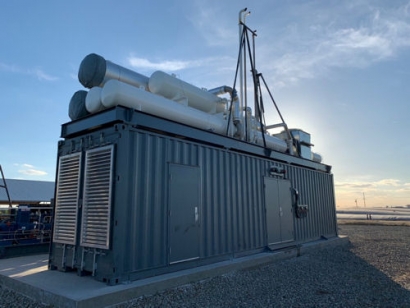
As a result of the MSA and additional expected orders, Xebec has also started the production of 30 Biostream units for delivery over the next year. The company’s increased manufacturing requirements are in part supported by the recently announced acquisition of Tennessee-based Nortec. Xebec’s Canadian manufacturing facility is being modified and is expected to allow for the annual production of approximately 30 to 40 Biostream units. In addition, the company is exploring new capacity in the U.S. as more purchase orders are signed.
“This is fantastic validation of our new Biostream product that is focused on animal manure feedstocks. The team has worked hard over the last two years to develop this containerized system which offers many benefits to customers such as short delivery times, fast installation, modularity, ability to automatically handle fluctuating flow rates, low operating costs and equally important, a very competitive price. This MSA shows the strong value proposition developers and farmers see in our products, as they accelerate the development of carbon-negative renewable natural gas production. We are proud to be playing such an important role in this energy transition and look forward to ramping up our production capacity,” stated Kurt Sorschak, Chairman, CEO and President of Xebec Adsorption Inc.
Biostream is an ideal solution for dairy farmers because of its containerized and fully automated design that offers easy and quick installation and commissioning, which combined, takes approximately 10 days. Customers will also enjoy the peace of mind knowing that Xebec’s Cleantech Service Network (CSN) will support them locally throughout the entire setup process and for the lifetime of their renewable natural gas equipment.
Biostream is positioned to capture the U.S. animal manure RNG market
According to the American Biogas Council, it is estimated that 8,574 dairy, poultry, and swine farms are primed for biogas and renewable natural gas production. Biostream is estimated to cover more than 80% of these animal manure use cases with multiple standardized configurations which range in capacity between 50 to 840 SCFM (90 to 1350 NCMH).
Dairy farms are leading livestock based RNG production in the U.S.
According to the EPA AgSTAR project database, as of May 2021, there are 333 operational and under construction digester projects that accept livestock manure. The majority (approximately 82%) of the manure-based digester projects are at dairy farms, and the rest are at swine or poultry farms. Of the 333 biogas projects, approximately 98 of them are producing RNG for the local CNG transportation market or for injection into the local pipeline.
RNG from dairy manure is unique in its carbon-negative attributes, with a negative carbon intensity score of -100 to -400 (according to California Air Resources Board) compared to a carbon intensity score of 102 and 34 to 75 for diesel and corn ethanol, respectively.
Xebec continues to see a positive and accelerating backdrop for the RNG industry as organizations and governments around the world aim to manage organic waste more effectively and decarbonize the energy supply, transportation and industry.

